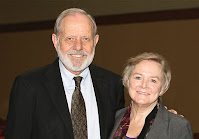Robert and Elizabeth Bjork are outstanding researchers on learning, the optimisation of memory in particular. The Bjork Learning and Forgetting Lab is a trusted source for contemporary research on cognitive science and learning theory. Their focus on memory led to research with real recommendations on how to teach and study, with a particular emphasis on effortful learning using desirable difficulties,
Illusory learning
Their starting point, based on evidence, is that many learners are mistaken at best, at worst delusional, when it comes to judgements on whether they have learned things or not. Learners may feel as though they have learnt knowledge or skills but subsequent tests often show that they have not. This is why self-reporting is not a valid method when reporting learning. This illusory or delusional view of learning is very common and results in shallow teaching methods and inefficient study strategies. The Bjorks believe that both teaching and learning can be improved and optimised by introducing techniques that force cognitive effort. Note that Richard Bjork also played a role in researching the lack of efficacy in learning styles in Paschler (2008).
Desirable difficulty
Learning should not be made too easy. Counterintuitively, making learning too easy may lead to easier forgetting. This is because desirable difficulties lead to deeper cognitive effort and processing. Desirable difficulties result in better long-term retention and examples of desirable difficulties may be spaced-practice, interleaving and retrieval practice. Desirable difficulty can also mean that you have to work that little bit harder to learn. But they call upon several techniques to provide desirable difficulties in learning, including but not exclusively:
Retrieval practice
Spaced practice
Generation
Interleaving
Retrieval practice
Do not read repeatedly and underline text, look away from the page and try to recall what you think you know. This act of recall has a strong reinforcement effect and results in higher retention and subsequent recall. The effort in processing increases remembering. Note that retrieval practice is not a test or assessment strategy but a learning experience. It is the repeated act of retrieval that is the most powerful learning experience. This is why frequent quizzing and testing can be a powerful teaching method. In online learning, retrieval can be made more effortful through open input questions.
Spaced practice
Spaced practice has also been shown, from Ebbinghaus onwards, to provide desirable difficulty, making learners repeatedly retrieve what they think they know thereby increasing retention and recall. This is not easy to implement but there are many techniques, offline and online that can be used. Topping and tailing with summaries of what was learnt last time, formal nudging, even use of social media are all possible, as are the use of online tools that automate and personalise the practice. It is frequently built into adaptive and personalised learning systems, like Duolingo.
Generation
Generating words and knowledge is better than simply reading text. It would appear that this act of generation provides the context for greater subsequent recall.
Interleaving
Interleaving, avoiding long sequences of similar material, interleaving very different learning tasks or variations on that task, increases retention, recall and skill acquisition. This may seem counterintuitive but shows that, rather than learning one thing for a long time, many things can be interleaved, to the benefit of the learner.
Metacognition
When we are aware of what makes us learn better and actively monitor this process, our study practices and schedules change. The Bjorks recommends that learners be taught good learning practices, such as retrieval, interleaving and spaced practice to increase their efficacy in learning.
Influence
The Bjorks have taken known practices in learning, and used controlled studies to show that, with changes in practice, we can learn more efficiently. Learning professionals and learners often engage in practices that are sub-optimal, worse still, they may inhibit efficient learning. Their recommended techniques may seem counterintuitive and difficult to implement as they run counter to most current practice but the evidence suggest that he is right. We see these recommendations increasingly used in education and training as those who both teach and learn become aware of these techniques. Technology has also allowed retrieval practice, interleaving and spaced practice to be more easily implemented over time on a personalised basis.

No comments:
Post a Comment